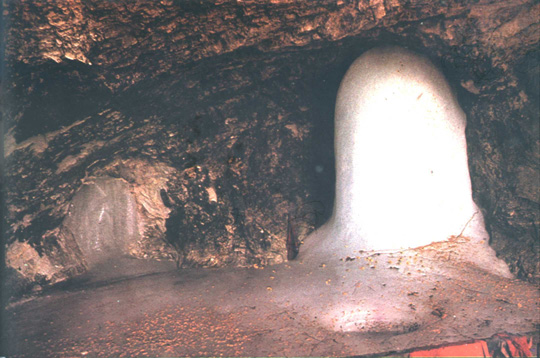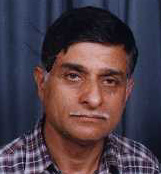|

|

|
|
Kashmiri Pandits' Association, Mumbai, India |

|
| | Home | June-July 2003 Issue | |
|
Stories for the Children
… M.K. Raina Three Questions - Part 2
Chalaka, had a cousin by name Taraka. He was a man of vices and had lost everything on drinking and gambling. He had to even sell off his land. Chalaka, tried to correct him many a times but to no avail. When Taraka turned a pauper, he got jealous of Chalaka. Chalaka having no inkling of Taraka's jealousy, wanted to help him. He gave him a small piece of land in charity and advised him to reform himself. Taraka accepted the offer but requested that the land be transferred through a proper deal. He said he was particularly suspicious of Pushpalata rescinding the offer after Chalaka was no more. Chalaka agreed and asked Taraka to get the transfer documented. Taraka got the documents and Chalaka put his seal on them. Taraka however did not take possession of the land immediately, stating that he was waiting for an auspicious time. As ill-luck would have it, Anusuya's father and mother met a fatal accident while on a pilgrimage. The news came as a shock to all the villagers, for whom they were next to God. Entire village mourned their death. But there was one man who rejoiced on their death. He was Taraka. After a couple of days, Taraka approached the still mourning Anusuya and Pushpalata and asked them to surrender their land and house to him. He showed them the papers bearing Chalaka's seal. He claimed that the property had been sold by his father to him. Anusuya and Pushpalata were taken aback. They were sure the papers were fraudulently obtained. They complained to the village elders, but they could not help. Papers clearly proved Taraka's claim. Anusuya and Pushpalata vacated the house. They erected a small hut in the corner of a vast area of barren land a little away from the village. This land also belonged to them and luckily was not included by Taraka in his deed. They moved into the hut along with their four year old son. Anusuya and Pushpalata had to start their life afresh. The land they owned now, was slopy and the river water could not reach it. Having no option, Anusuya decided to cultivate a small portion of land with such crops needing scanty rainfall. He worked hard and gradually started earning a meagre livelihood. A good house had always been Pushpalata's dream. She did not mourn the loss of land as much as she mourned the loss of her house. Anusuya knew it. He promised to give her a new house but did not succeed. He had nobody to help him. And the Rain-god did not seem to favour him either. • • • Ananta was moved with Anusuya's pathetic story. He decided to help him. So when Anusuya asked him if he could work with him in his fields, Ananta agreed immediately. He had no specific destination. He thought it was better to start looking for the answers right from here. And who knew, God only brought him to that place to know the truth? Anusuya and Ananta first removed all thorny bushes and stones from the entire barren land. They then levelled it in terraces. It took them almost three months. At the extreme elevation, there was a big hump of stone conglomerate. They started breaking the hump with whatever means they had. After days of toil, when they were about to finish the job, a miracle occurred. Ananta's axe struck the bed of the conglomerate with a bang. A crevice was formed and water came gushing out through it, in the form of a spring. Anusuya and Ananta, both cried out with joy. Water flowed down with force, flooding the entire land below. Anusuya ran home to tell Pushpalata about the miracle. Ananta sat on a stone nearby, watching the water meandering its way all through the land. On reaching the site, Pushpalata could not believe her eyes. She fell at Ananta's feet in gratitude. Ananta had brought them good luck. With their sheer will, Anusuya and Ananta transformed the whole area into a beautiful cascade of fields. These fields became the prize land of the village now, because of the high yielding spring. In six months' time, the duo's hard work bore fruit. The fields were full of golden crop which fetched Anusuya a very good sum. Second harvest earned him much more than his expectations. He then started constructing his new house. In a short span of time, Anusuya was well settled. Pushpalata was very happy, for, she had a good house now. Ananta was also happy working for Anusuya. In due course of time, Anusuya earned a fortune. Pushpalata was fond of jewellery. She told her husband that she wished to buy a jewel-studded necklace for herself. Anusuya bought her a necklace, studded with gems, which was unique piece. Pushpalata wore it around her neck. She was all smiles, her desire fulfilled. She did not part with it even for a moment. Now the necklace was more dear to her than any thing else. Ananta thought, he found an answer to one of his question: 'What is that which a woman loves most?' And the answer was certainly 'Her Jewellery'. He was now planning to leave the village, but Anusuya did not allow him. He wanted Ananta to stay for some time more. Ananta agreed. A few days passed. Anusuya and Pushpalata visited a fair in the neighbouring town. Ananta stayed back to look after the child. There were hundreds of well decorated stalls at the fair, selling items brought from distant places. There were cattle shows and a variety of entertainment programmes held under colourful Shamianas. Anusuya and Pushpalata went inside a Shamiana to witness a magic show. Suddenly, during the course of the show, the shamiana caught fire. There was a chaos. People were running helter-skelter for safety. There were cries and screams, some falling down and others trampling them. Anusuya caught his wife by her hand and almost dragged her. In the confusion, Pushpalata's necklace slipped down. Pushpalata jerked out her hand from that of Anusuya's and turned back in search of the necklace. Anusuya persuaded her not to bother for the necklace and instead run for safety. But she would not listen. She managed to get her hands on the necklace but as soon as she turned around, a burning wooden structure collapsed and fell on her. Anusuya could only hear her groan. He ran towards her and with the help of a few people, he managed to get her out. Her face was badly burnt but the necklace was still tightly clinched in her hand. Anusuya summoned the best hakeems and vaids, to treat Pushpalata. They did their best but could not restore back her original beauty. Pushpalata was desperate. One of the hakeems advised them to seek help from a Tantrik at a far off place, who, he claimed, had magical powers and was known to have treated many such cases. Anusuya summoned him. The Tantrik had a look at Pushpalata's face. He assured to restore her face, but demanded a sum beyond Anusuya's means. Even by selling his house, he would not make the requisite amount. So Pushpalata decided to offer her necklace. "Beauty is more valuable than the stones", she concluded. And the necklace changed hands. True to his word, the Tantrik performed miracle. Pushpalata's beautiful face was restored. No one could now say that she had ever burnt her face. Anusuya and Ananta could not believe their eyes. Ananta had to revise the answer to his question. In his opinion now, a woman loved her beauty most. And this time, he was doubly sure, he had the right answer. Ananta got ready to leave for his next destination. Anusuya, Pushpalata and their child had returned to the old hut. Ananta was sure, Anusuya would rise again. He promised Anusuya that on his return, he would visit them. • • • Ananta set out for a new unknown destination. He had to make his way through mountains and jungles. He came across a group of shepherds. They informed him of a town named Saraspur on other side of the mountain. It took Ananta three days to reach this town, while on his way, he spent his nights with the shepherds. Saraspur was a beautiful town. It was located on the bank of river Saraswati. Ananta reached there at noon. He went to the river and had a bath. He saw a number of Brahmins performing religious rites at the ghat. Ananta watched them for a while and then retreated to a nearby temple. After performing puja in the temple, Ananta decided to take a walk down the market. He was very hungry, but nobody would feed him for free. While on stroll, he saw a middle aged man dressing stones. The man was totally engrossed in his work. Ananta observed that there were a number of stone blocks on one side and a few carved stones on the other side. Ananta went up to him and introduced himself. He then enquired if he could get a job as he was badly in need of one. The stone carver whose name was Mihira, was alone and had a lot of work in hand. He readily offered him one. On knowing that Ananta was hungry, Mihira offered him food from his stock. Mihira's job was to dress and carve stones. These stones were used for constructing houses. Intricately carved stones were also used in construction of temples. Mihira's stones were very much in demand because of their finish. But he was unable to cope with the demand. He had employed a few people initially but they left one by one because of strenuous nature of work. Mihira was however contented with his earning and lived happily with his wife. Ananta picked up the job very fast. Mihira was pleased with his work. On seeing Ananta doing a good job, more and more people joined them. In a short span of time, Mihira became a big supplier of carved stones. His stones were now in demand in other villages and towns. His business began to flourish. |
|
|
JOIN US |
|
|


 Anusuya
revealed that he was not always a poor man, but hailed from a well to do
family. His father Chalaka was a pious man and helped the needy. His
mother was an orthodox lady, shrewdly dedicated to her religion. She would
seldom venture out of her house. The family had a large chunk of land
which was enough to feed them throughout the year. They also had a good
house to live in. At the age of twenty, Anusuya was married to Pushpalata.
They were a happy family.
Anusuya
revealed that he was not always a poor man, but hailed from a well to do
family. His father Chalaka was a pious man and helped the needy. His
mother was an orthodox lady, shrewdly dedicated to her religion. She would
seldom venture out of her house. The family had a large chunk of land
which was enough to feed them throughout the year. They also had a good
house to live in. At the age of twenty, Anusuya was married to Pushpalata.
They were a happy family.

